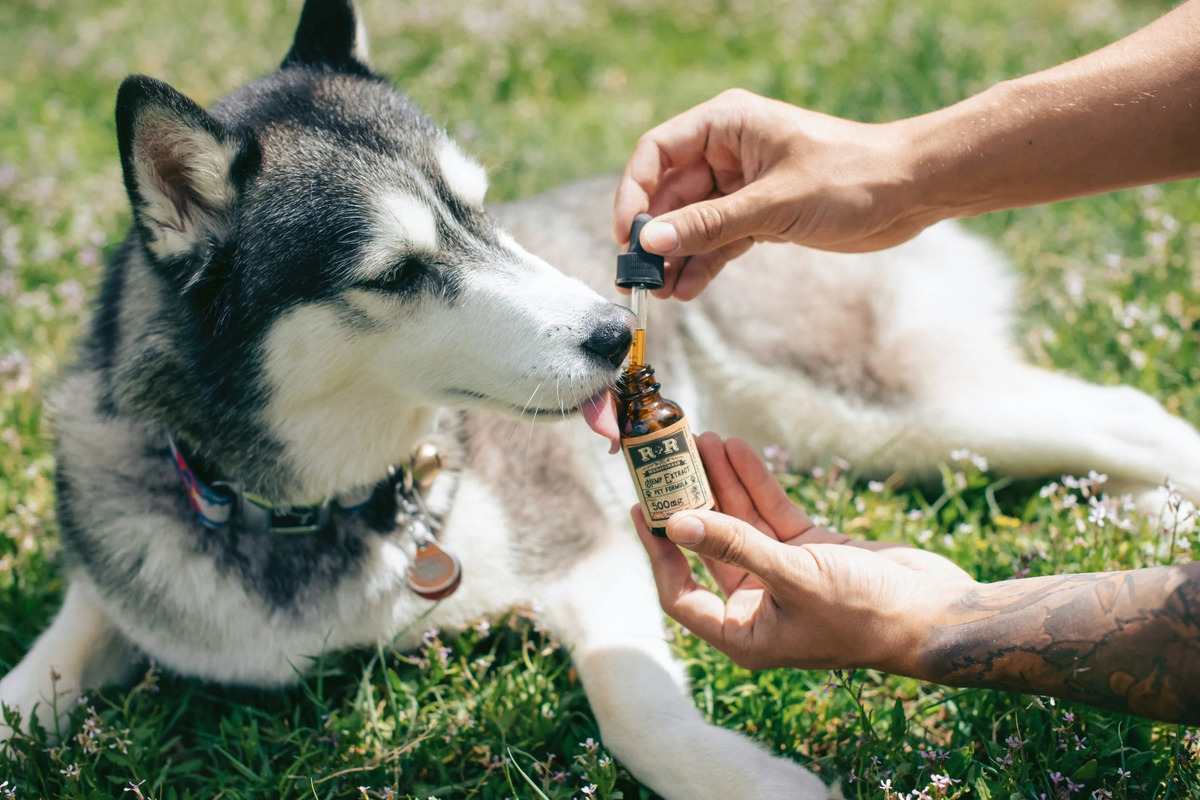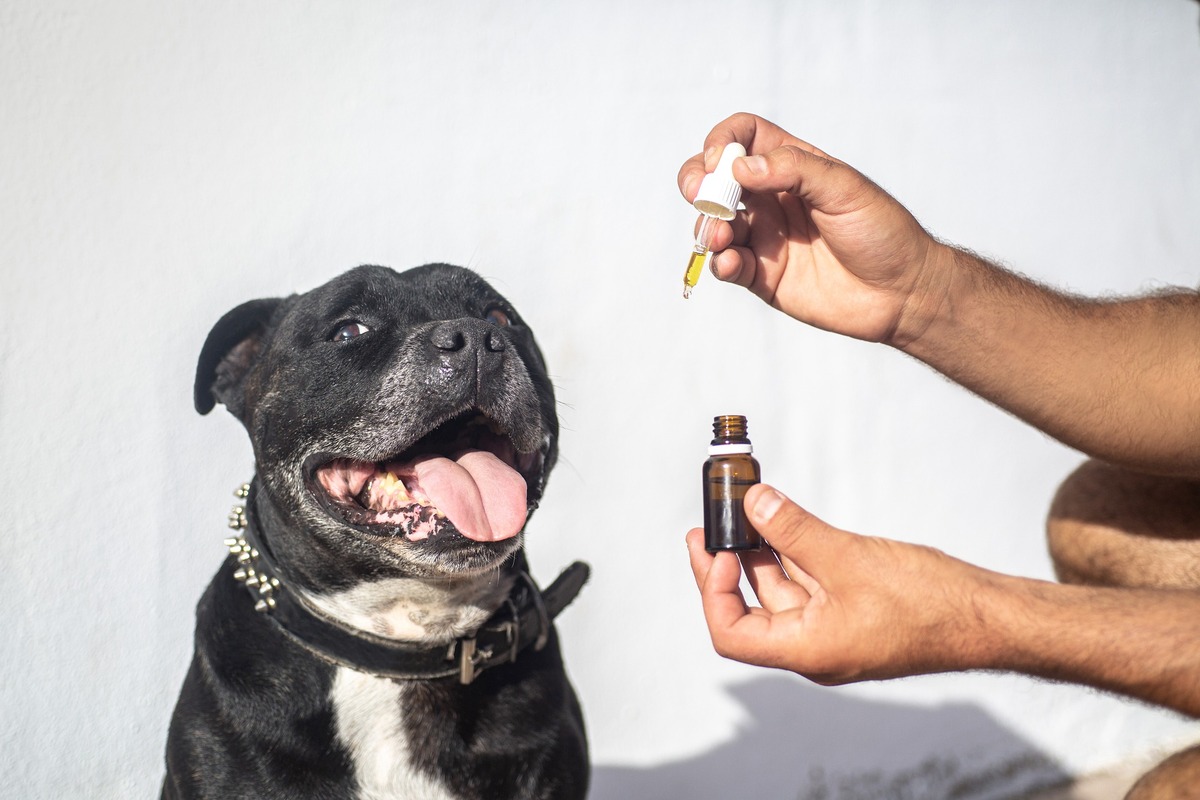Home>Health & Wellness>Common Health Issues>How To Use Hemp Oil Or CBD Oil For Dog Allergies


Common Health Issues
How To Use Hemp Oil Or CBD Oil For Dog Allergies
Modified: February 20, 2024
Learn how to use hemp oil or CBD oil to alleviate your dog's allergies and other common health issues. Discover the benefits and best practices for treating your pet naturally.
(Many of the links in this article redirect to a specific reviewed product. Your purchase of these products through affiliate links helps to generate commission for Pawsomeoldies.com, at no extra cost. Learn more)
Table of Contents
Introduction
As a pet owner, ensuring the well-being of your furry companion is a top priority. Just like humans, dogs can experience a range of health issues, including allergies. These allergies can cause discomfort and distress for your beloved pet, leading to itching, redness, and other unpleasant symptoms. Fortunately, there are natural remedies that can help alleviate these issues, such as hemp oil and CBD oil.
In recent years, there has been a growing interest in the potential benefits of hemp oil and CBD oil for managing various health conditions in dogs, including allergies. Both hemp oil and CBD oil are derived from the cannabis plant, but they differ in their composition and potential effects. Understanding the distinctions between these two oils and their potential applications is crucial for pet owners seeking natural solutions for their dog's allergies.
In this comprehensive guide, we will delve into the nuances of hemp oil and CBD oil, explore how to identify allergies in dogs, and discuss the potential uses of these oils for alleviating allergic symptoms in our canine companions. Additionally, we will shed light on the potential risks and side effects associated with using these oils, empowering pet owners to make informed decisions about their pet's health.
By the end of this guide, you will have a deeper understanding of how hemp oil and CBD oil can be utilized to address dog allergies, enabling you to provide your furry friend with the care and relief they deserve. Let's embark on this enlightening journey to discover the natural potential of hemp oil and CBD oil for managing dog allergies.
Read more: How To Use Tea Tree Oil For Dog Fleas
Understanding Hemp Oil and CBD Oil
Hemp oil and CBD oil have garnered significant attention for their potential health benefits, not only for humans but also for our canine companions. It's essential to grasp the distinctions between these two oils to make informed decisions about their potential applications for managing dog allergies.
Hemp Oil:
Hemp oil, also known as hemp seed oil, is derived from the seeds of the hemp plant. It contains a rich array of nutrients, including omega-3 and omega-6 fatty acids, which are beneficial for skin health. Additionally, hemp oil is a good source of gamma-linolenic acid (GLA), an omega-6 fatty acid known for its anti-inflammatory properties. These components make hemp oil a promising natural remedy for addressing allergic reactions in dogs, as it may help soothe skin irritation and reduce inflammation.
CBD Oil:
On the other hand, CBD oil, short for cannabidiol oil, is extracted from the flowers, leaves, and stalks of the hemp plant. Unlike hemp oil, CBD oil contains high concentrations of cannabidiol, a non-psychoactive compound known for its potential therapeutic effects. CBD interacts with the endocannabinoid system in the body, which plays a crucial role in regulating various physiological functions, including immune response and inflammation. This interaction has led to growing interest in the potential anti-inflammatory and immunomodulatory properties of CBD oil for managing allergic conditions in dogs.
Distinguishing Factors:
One key distinction between hemp oil and CBD oil lies in their cannabinoid content. While hemp oil contains negligible amounts of cannabinoids, CBD oil is specifically formulated to contain significant levels of cannabidiol. This disparity in cannabinoid composition gives CBD oil its unique potential for modulating the body's immune response and inflammatory processes, which are central to allergic reactions.
Understanding the differences between hemp oil and CBD oil is pivotal for pet owners seeking natural remedies for dog allergies. Both oils offer distinct properties that may contribute to alleviating allergic symptoms in dogs, whether through the anti-inflammatory effects of hemp oil or the potential immunomodulatory properties of CBD oil. With this knowledge in hand, pet owners can explore the potential applications of these oils to provide relief for their furry companions.
Identifying Dog Allergies
Identifying dog allergies can be a challenging yet crucial task for pet owners. Allergies in dogs can manifest in various ways, often leading to discomfort and distress for our furry companions. It's essential to recognize the signs and symptoms of allergies to take proactive measures and provide relief for our beloved pets.
Common Allergic Reactions in Dogs
Allergic reactions in dogs can stem from a myriad of sources, including environmental allergens, such as pollen, mold, and dust mites, as well as food ingredients, such as certain proteins or grains. The most prevalent allergic reactions in dogs often manifest as:
- Skin Irritation: Dogs may experience itching, redness, and inflammation of the skin, often leading to excessive scratching or licking of affected areas.
- Ear Infections: Allergies can contribute to ear infections in dogs, characterized by redness, odor, and discharge from the ears, as well as frequent head shaking or pawing at the ears.
- Gastrointestinal Distress: Some dogs may exhibit allergic reactions through gastrointestinal symptoms, including vomiting, diarrhea, and excessive gas.
Observing Behavioral and Physical Cues
To identify potential allergies in dogs, pet owners should remain vigilant and observant of their pet's behavior and physical condition. Common cues that may indicate allergic reactions include:
- Excessive Scratching or Licking: Persistent scratching or licking of the skin, paws, or ears can signal underlying allergic issues.
- Skin Redness and Irritation: Red, inflamed patches of skin, hot spots, or rashes may indicate allergic dermatitis.
- Ear Discomfort: Dogs experiencing ear allergies may display signs of discomfort, such as frequent head shaking, pawing at the ears, or emitting a foul odor from the ears.
- Gastrointestinal Symptoms: Vomiting, diarrhea, or changes in stool consistency can point to potential food allergies or sensitivities.
Seeking Veterinary Evaluation
When suspecting allergies in dogs, seeking professional veterinary evaluation is paramount. Veterinarians can conduct comprehensive assessments to pinpoint the underlying causes of allergic reactions through various diagnostic methods, such as skin tests, blood tests, and elimination diets. These evaluations enable accurate identification of allergens, facilitating the development of targeted treatment plans to alleviate allergic symptoms in dogs.
By remaining attentive to behavioral cues, physical manifestations, and seeking veterinary guidance, pet owners can effectively identify and address allergies in their dogs, paving the way for tailored interventions to promote their pet's well-being and comfort.
Using Hemp Oil for Dog Allergies
Hemp oil has emerged as a promising natural remedy for addressing allergic reactions in dogs. Its rich composition of omega-3 and omega-6 fatty acids, along with gamma-linolenic acid (GLA), positions it as a potential ally in managing allergic symptoms in our canine companions.
Soothing Skin Irritation
One of the primary benefits of hemp oil for dog allergies lies in its ability to soothe skin irritation. Allergic reactions in dogs often manifest as itching, redness, and inflammation of the skin, leading to discomfort and distress. The anti-inflammatory properties of GLA, an omega-6 fatty acid found in hemp oil, can help alleviate these symptoms by reducing redness and swelling, providing relief for dogs experiencing allergic dermatitis.
Supporting Skin Health
Furthermore, the omega-3 fatty acids present in hemp oil play a crucial role in supporting overall skin health. These essential fatty acids contribute to maintaining the skin's natural barrier function, which is pivotal in protecting against environmental allergens and irritants. By bolstering the skin's resilience, hemp oil may help mitigate the impact of allergens, reducing the likelihood and severity of allergic reactions in dogs.
Incorporating Hemp Oil into the Canine Diet
Integrating hemp oil into a dog's diet can be a practical and effective approach to harness its potential benefits for managing allergies. Whether administered directly or mixed with food, hemp oil offers a convenient means of delivering its beneficial components to dogs. Pet owners can work with veterinarians to determine appropriate dosage and application methods, ensuring that their furry companions receive the optimal support from hemp oil in addressing allergic symptoms.
Exploring Topical Applications
In addition to dietary incorporation, hemp oil can also be utilized topically to target specific areas of skin irritation. Applying hemp oil directly to affected areas can provide localized relief, soothing itching and redness while nourishing the skin. This targeted approach allows pet owners to address allergic dermatitis and related symptoms directly, offering comfort and support for their dogs.
Holistic Approach to Allergy Management
It's important to note that while hemp oil shows promise in alleviating allergic symptoms in dogs, it is not a standalone solution. A holistic approach to allergy management, encompassing environmental modifications, dietary considerations, and potential veterinary interventions, is crucial for comprehensive care. By integrating hemp oil into a multifaceted allergy management strategy, pet owners can enhance their efforts to provide relief and comfort for their beloved canine companions.
Incorporating hemp oil into the care regimen for dogs with allergies holds potential for mitigating symptoms and promoting overall well-being. Its natural properties, coupled with its versatility in administration, make it a valuable consideration for pet owners seeking natural remedies to support their furry friends through allergic challenges.
Using CBD Oil for Dog Allergies
CBD oil, derived from the hemp plant, has garnered attention for its potential therapeutic properties, making it a compelling option for addressing allergic reactions in dogs. The non-psychoactive compound cannabidiol (CBD) found in CBD oil interacts with the endocannabinoid system in the body, which plays a pivotal role in regulating immune response and inflammatory processes. This interaction forms the basis for exploring the potential applications of CBD oil in managing dog allergies.
Read more: What CBD Oil Can I Give My Dog For Anxiety
Modulating Immune Response
One of the key mechanisms through which CBD oil may benefit dogs with allergies is its potential to modulate the immune response. Allergic reactions in dogs are characterized by an overactive immune response to perceived threats, leading to inflammation and discomfort. CBD's interaction with cannabinoid receptors in the endocannabinoid system has been linked to immune-modulating effects, which may help temper the exaggerated immune response associated with allergies. By exerting regulatory influence on immune function, CBD oil holds promise in mitigating the severity of allergic reactions in dogs.
Alleviating Inflammatory Symptoms
In addition to immune modulation, CBD oil's anti-inflammatory properties are of particular significance in the context of managing allergic symptoms in dogs. Allergic reactions often trigger inflammatory processes that contribute to itching, redness, and discomfort. CBD's potential to mitigate inflammation through its interaction with cannabinoid receptors presents an avenue for providing relief to dogs experiencing allergic dermatitis and related symptoms. By addressing the underlying inflammatory component of allergies, CBD oil may offer tangible comfort and support for affected dogs.
Supporting Stress Reduction
Furthermore, CBD oil's potential to alleviate stress and anxiety in dogs can be beneficial in the context of managing allergies. Allergic reactions can induce stress and discomfort in dogs, exacerbating their symptoms and diminishing their overall well-being. CBD's anxiolytic properties, demonstrated in various studies, may help mitigate the stress response associated with allergies, promoting a sense of calm and comfort for affected dogs. By addressing both the physical and emotional aspects of allergic reactions, CBD oil offers a holistic approach to supporting dogs through allergic challenges.
Tailored Dosage and Administration
When considering the use of CBD oil for dog allergies, it is crucial to work closely with veterinarians to determine the appropriate dosage and administration methods. Veterinarians can provide tailored guidance based on the specific needs and conditions of individual dogs, ensuring that CBD oil is integrated into their care regimen effectively and safely. By leveraging professional expertise, pet owners can optimize the potential benefits of CBD oil for managing allergic symptoms in their furry companions.
Incorporating CBD oil into the holistic care approach for dogs with allergies presents an opportunity to leverage its potential immune-modulating, anti-inflammatory, and stress-alleviating properties. By integrating CBD oil into a comprehensive allergy management strategy, pet owners can enhance their efforts to provide relief and comfort for their beloved canine companions.
Potential Risks and Side Effects
While hemp oil and CBD oil hold promise as natural remedies for managing dog allergies, it is essential for pet owners to be aware of the potential risks and side effects associated with their use. Understanding these considerations is crucial for making informed decisions about integrating these oils into a dog's care regimen.
Hemp Oil:
Hemp oil is generally well-tolerated by dogs, and adverse effects are rare when administered in appropriate dosages. However, it's important to note that individual sensitivities can vary, and some dogs may exhibit mild digestive disturbances, such as diarrhea or loose stools, when first introduced to hemp oil. Monitoring the dog's response and adjusting the dosage as needed can help mitigate such effects. Additionally, while hemp oil is rich in beneficial nutrients, excessive consumption can lead to an imbalance of fatty acids, potentially impacting overall health. Therefore, pet owners should adhere to recommended dosages and seek guidance from veterinarians to ensure the appropriate use of hemp oil for their dogs.
CBD Oil:
When considering the use of CBD oil for dog allergies, it's crucial to be mindful of potential side effects, albeit uncommon, that may arise. While CBD is generally well-tolerated, some dogs may experience temporary drowsiness or mild gastrointestinal upset during the initial stages of CBD oil administration. These effects typically subside as the dog's system adjusts to the oil. Additionally, interactions with certain medications should be taken into account, as CBD can influence the metabolism of certain drugs through its interaction with liver enzymes. Pet owners should consult with veterinarians to assess potential drug interactions and ensure the safe integration of CBD oil into their dog's care plan.
General Considerations:
In both hemp oil and CBD oil usage, quality and sourcing are paramount. Ensuring that the oils are derived from reputable sources and undergo rigorous testing for purity and potency is essential for safeguarding the well-being of dogs. Furthermore, pet owners should prioritize transparency and communication with veterinarians, providing comprehensive information about their dog's health status, existing medications, and any observed reactions to the oils. This collaborative approach enables veterinarians to offer tailored guidance and monitor the dog's response to hemp oil or CBD oil, optimizing their potential benefits while minimizing risks.
By being attentive to potential risks and side effects, pet owners can navigate the use of hemp oil and CBD oil for managing dog allergies with prudence and care. With a proactive and informed approach, pet owners can harness the potential of these natural remedies while prioritizing the safety and well-being of their furry companions.
Conclusion
In conclusion, the potential of hemp oil and CBD oil as natural remedies for managing dog allergies offers a glimmer of hope for pet owners seeking holistic and gentle interventions for their furry companions. The distinct properties of hemp oil, including its rich composition of omega-3 and omega-6 fatty acids, as well as the anti-inflammatory effects of gamma-linolenic acid (GLA), position it as a promising ally in soothing skin irritation and supporting overall skin health in dogs with allergies. On the other hand, CBD oil's interaction with the endocannabinoid system presents an intriguing avenue for modulating immune response, alleviating inflammatory symptoms, and promoting stress reduction in dogs experiencing allergic reactions.
By understanding the nuances of these oils and their potential applications, pet owners can explore tailored approaches to address the multifaceted nature of dog allergies. From dietary incorporation to topical applications, hemp oil offers versatility in its administration, providing a practical means of delivering its beneficial components to dogs. Similarly, the immune-modulating, anti-inflammatory, and stress-alleviating properties of CBD oil present a holistic approach to supporting dogs through allergic challenges, emphasizing the potential for comprehensive relief and comfort.
However, it is crucial for pet owners to approach the use of hemp oil and CBD oil with a balanced perspective, taking into account potential risks and side effects. Monitoring the dog's response, adhering to recommended dosages, and seeking guidance from veterinarians are essential steps in ensuring the safe and effective integration of these oils into a dog's care regimen.
In the journey to address dog allergies, a collaborative and informed approach between pet owners and veterinarians is pivotal. By fostering open communication and transparency, pet owners can navigate the use of hemp oil and CBD oil with prudence and care, optimizing their potential benefits while prioritizing the safety and well-being of their beloved canine companions.
Ultimately, the exploration of natural remedies such as hemp oil and CBD oil for managing dog allergies reflects a profound commitment to providing compassionate and tailored care for our furry friends. As the bond between humans and dogs continues to flourish, the pursuit of gentle and effective solutions for addressing allergic challenges stands as a testament to our unwavering dedication to the well-being of our cherished canine companions.










